Dentures – Savannah, GA
Have the Confidence to Smile Again
Whether you’ve lost teeth to gum disease, tooth decay, or injury, it’s always a good idea to replace them when they go missing. That way, you can maintain your oral health and prevent long-term problems! With that said, you may want to try dentures in Savannah. This treatment from Compass Dental will restore your smile and make your mouth healthier. If you’d like to learn more about it, just keep reading or contact our office for details.
Why Choose Compass Dental for Dentures?
- Natural-Looking Dental Materials
- Highly Customizable Partial and Full Dentures
- Dentist Is an Expert in Facial Esthetics
Who’s a Good Candidate for Dentures?

If you suffer from the effects of tooth loss, you’re likely a good candidate for dentures. After all, lacking teeth can make it hard to eat or speak in daily life. Even smiling becomes a challenge due to the embarrassment of showing your gaps. If you don’t initially make a good candidate, we may be able to work with you to restore the health of your gum tissue and bone structure so you can become one in the future. Then, we can put together a treatment plan that’s right for you.
Effects of Missing Teeth

Teeth are very strong, but they aren’t indestructible. The more common causes of tooth loss include tooth decay, gum disease, and injury. According to the American Academy of Periodontology, this can lead to a variety of negative consequences, including facial sagging, difficulty speaking, trouble eating, and a lower self-esteem. By restoring your smile with dentures, you can improve all of these areas of your life, showing off a beautiful, complete smile again!
What Qualifies You for Dentures?

Dentures are an excellent option for patients who have experienced significant tooth loss. Those who get dentures must also be committed to their dental hygiene routine and willing to properly care for their dentures and smile.
The number of teeth you are missing and where they are located in your mouth will determine which type of denture is best for you. One of the great things about dentures is that they are more affordable than other tooth-replacement options, making them ideal for those who are unable to invest a lot of money into their smile at this time.
Alternative Tooth-Replacement Options

If you don’t make a good candidate for dentures, or they don’t seem like the ideal option for you, you can check out some of our other solutions to tooth loss:
- Dental Bridges: Dental bridges work by “bridging” the gap with a replacement tooth via dental crowns. This is ideal for patients who are only missing one or a few teeth. They require healthy teeth surrounding the missing tooth/teeth to support the bridge.
- Dental Implants: A dental implant is a titanium post that is inserted into the jawbone via a surgical procedure. To get dental implants, patients must have a solid bone structure. This option is more costly than traditional dentures, but it’s permanent.
Types of Dentures
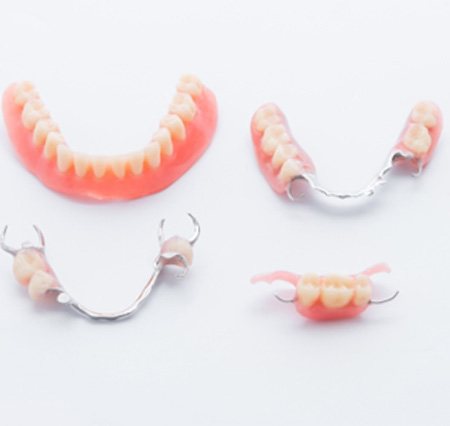
Before the actual denture treatment, you’ll need to consult with Dr. Fana. Doing so helps you grasp how your future results will look. Plus, a consultation lets our team learn your smile goals, medical history, etc.
Based on this discussion (and an oral exam), our office will suggest one of three types of dentures. These options include:
Partial Dentures
Partial dentures only replace a few teeth, typically on opposite sides of the arch. As such, they rely on a unique frame to connect to existing teeth.
In most cases, partial dentures are made of removable, replacement teeth attached to a pink acrylic base.
Full Dentures
Per their name, full dentures replace all the teeth along an arch. They thus use natural suction to keep themselves in place, forming a seal with the gums.
Full dentures consist of a plastic base colored to mimic gum tissue effectively. That base, in turn, is filled with composite resin or porcelain teeth.
Implant Dentures
Consider implant dentures if you’d like a more permanent and unwavering option. These kinds use dental implants to stay secure.
Due to relying on implants, implant dentures are made to be fixed. Only a professional dentist is qualified to remove them for replacement purposes.
How Dentures Are Made
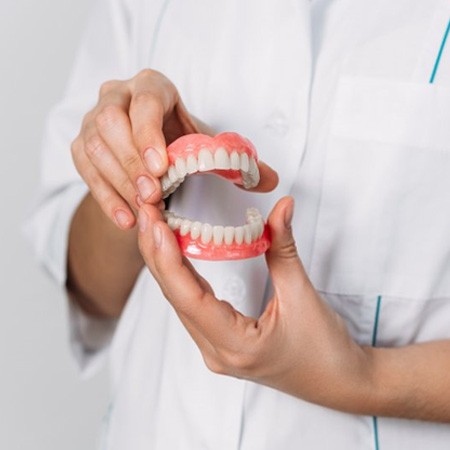
Are you interested in restoring your bite with dentures? While this treatment is an effective way to replace missing teeth, and you can expect to appreciate a wide range of advantages to your oral health afterward, you might wonder how exactly the prosthetics are created. Here’s a brief look at the denture creation process so that you can understand the steps taken to restore your grin.
What Are Dentures Made Of?
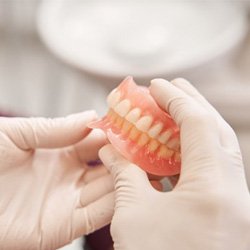
Your denture will consist of two main components: the base and the artificial pearly whites. Here’s what to expect from each part:
- Denture Base : This portion is the foundation and “stepping stone” for renewing your bite. The base is designed to support your replacement teeth, and it can be constructed out of a wide range of materials, such as resin, metal, nylon, acrylic, or porcelain. In most cases, full dentures will likely be made from acrylic due to its durability and ability to perfectly match your natural gum tissue. For partial dentures, you might expect an acrylic base with metal clasps for support.
- Artificial Teeth : Your replacement teeth will be fitted into the denture base, and they’ll usually be made out of resin or porcelain for their natural-looking appearance. That said, porcelain is perhaps the more popular option because of its durability and more lifelike feel. Since porcelain might be abrasive on nearby natural teeth, it’s mainly used for full dentures.
The Denture Creation Process
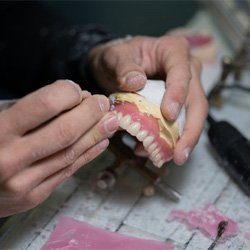
Creating your dental prosthetic will involve multiple steps over a couple of appointments. Here’s what you can expect from the process:
- Our team will take impressions of your smile as well as measurements of your jaw—both of which will be used to construct a plaster replica of your mouth. This cast will then be sent to a dental lab so they can create your dentures.
- Using the replica, the lab technicians will develop a wax version of your gum line so that they can place artificial teeth with an articulator. Minor adjustments will be made to ensure the wax perfectly matches your natural gums.
- Once the wax dentures are fabricated, they’ll be brought to us for a fitting. Should we approve them, we’ll send them back to the lab for finalization.
- At the lab, the technician will place the dentures in a flask of which plaster will be poured to preserve the shape of the prosthetics. This flask will then be boiled in hot water to melt off the wax.
- Holes will be made in the teeth so that the material can stick to them. The plaster layer will have a liquid separator added to it to keep the acrylic from attaching, then acrylic will be injected into the flask to replace the wax.
- The technician will then carefully remove the plaster with special tools to uncover the dentures before placing them in an ultrasonic bath for more thorough plaster removal. Any excess acrylic will be cut away before the dentures are trimmed and polished for completion.
- Once your final dentures are ready, you’ll return to us to receive them. We’ll make any minor adjustments to ensure they properly fit before letting you make the most of your new smile.
Adjusting to Your New Dentures

Some minor degree of discomfort is to be expected when wearing your dentures for the first time. Your gums and any other existing teeth will need to grow accustomed to the new prosthetics, which can make it difficult to eat and speak effectively at first. Thankfully, with a little time, repetition, and practice, you can help your new smile feel much more natural and comfortable in no time! Don’t hesitate to consult our team if you need help with this adjustment process, as we can provide you with adhesive if necessary. Be sure to also stick to softer foods and exercise your facial muscles regularly.
The Benefits of Dentures

Considering all the struggles those with tooth loss face, getting dentures becomes an obvious no-brainer. Dentures effectively replace missing teeth for years at a time. Since they often last 7-10 years, they tend to be a good investment—that’s just one example! These prosthetics restore both function and appearance, which means they offer practical as well as priceless, intangible benefits.
Psychological Benefits

When you have gaps in your smile, you may experience embarrassment or be hesitant to draw attention to yourself, talk, or eat around other people. Due to being custom-made, dentures look like natural teeth and blend seamlessly with your smile. As a result, you may not mind standing out in front of others. You can feel more confident showing your prosthetic pearly whites and feel a significant boost in your self-esteem.
Clearer Enunciation

Missing teeth can make pronouncing certain words difficult to put it mildly, and being unable to clearly communicate verbally can be isolating. However, dentures provide the oral structure needed to articulate sounds. Consequently, you can more easily connect with those around you. Just imagine the conversations you can have with friends, family, and others!
Improves Nutrition

Gum tissue is sensitive and soft—not the best for biting and grinding up food. If you don’t have a complete set of teeth, eating can present a challenge. Unfortunately, soft foods tend to be less nutritious. On the other hand, with replacement teeth like dentures, you’ll find it easier to bite and chew your favorite foods. They’ll thus let you eat a more nutritious diet that boosts your overall health.
Preserves Oral Health

For those with natural teeth left, a partial denture maintains the proper spacing, which preserves these teeth for as long as possible. Otherwise, these teeth will shift out of alignment and be at an increased risk of future extraction. In addition, implant dentures, specifically, can prevent facial collapse. In maintaining your jawbone, then, they’ll keep your cheeks from looking hollow!
Expands Opportunities

Whether you would like to get a better job, meet new people, or even find a romantic partner, having a whole, confident smile can open doors. In fact, studies show that those who with an attractive smile are more likely to be promoted and get hired. Who knows what could result from replacing your missing teeth with natural-looking dentures?
Understanding the Cost of Dentures

As with all dental procedures, the cost of customized dentures varies from patient to patient. If you’re ready for tooth replacement, but don’t know where to begin when considering the financial aspects of your new smile, continue reading below. You’ll find the factors that influence the price of your treatment and some ways our team at Compass Dental can make dentures more affordable for you!
Factors that Affect the Cost of Dentures

There are three major factors that determine the overall cost of your dentures:
- The Base: This is one of two main pieces that make up a typical denture prosthetic. The type of material used in the base of the denture (usually acrylic) can vary in price and quality.
- The False Teeth: The second main part of a denture is the teeth themselves. These are most often made from porcelain, but there are other options available.
- Mouth Preparation: If you need any preparatory treatments before getting dentures such as extractions, they can increase the overall cost of your dentures.
Are Implant Dentures More Expensive?

Typically, implanted dentures are far more expensive because of the unique system of attachment. However, they can also be one of the sturdiest and most comfortable ways to handle tooth replacement. Because these prosthetics are anchored by strategically placed dental implants, they don’t slip. They also last much longer without needing to be replaced and can even help preserve your jawbone, unlike traditional dentures. So, while implanted dentures may cost more up-front, they offer a long-lasting solution with several distinct advantages.
Does Dental Insurance Cover Dentures?

In most cases, dental insurance providers cover dentures as a major procedure, which usually means they will pay around 50 percent of the costs. However, the details of insurance plans can differ, so it’s important to make sure you have coverage before beginning your treatment. Our staff are insurance experts and will be happy to help you sift through your policy. They’ll even handle filing any claims you may have, providing you with peace of mind.
Other Options for Making Dentures Affordable

We know that not every patient can afford dental insurance. This is why we’ve made every effort to ensure that this vital treatment is accessible for our patients; no matter what their situation. If you’re struggling to find the funds for your dentures, we offer an exclusive dental wellness plan as well as financing through CareCredit.
- Dental Wellness Plan: Our dental wellness plan provides many of the same benefits as traditional insurance but without the hassle of deductibles, annual limits, and tedious claim forms.
- CareCredit: This service lets qualifying patients finance their dental work up front and pay it off with monthly installments like a credit card. However, with CareCredit, there’s little to no interest added to the balance.
Dentures Aftercare

Since your dentures restore the function and appearance of your smile, it’s important to take excellent care of them so they can last for as long as possible. Even if you have few or no natural teeth remaining, it’s still important to come to our Savannah office for routine exams and cleanings every six months. This will allow our team at Compass Dental to monitor your oral health and address any issues in a timely manner while also screening for abnormalities that might indicate oral cancer. It can be quite hard to notice many oral health issues on your own when you’re wearing dentures, and early detection is the best way to make a full recovery.
Removable Dentures

Remove After Eating
Remove and rinse your dentures after every meal to prevent accumulations of plaque and food debris. However, remember not to use hot water, as this can warp your dentures and ruin the way they fit.
Clean Your Restoration
Your dentures must be removed and cleaned every day. Gently brush your appliance with a soft-bristled toothbrush and a little bit of mild dish soap, unscented hand soap, or an approved denture cleanser. Remember not to use regular toothpaste, as it is too abrasive and can leave unsightly scratches on your dentures. If you’re not putting your dentures back in immediately, store them in a container of water or denture-cleansing solution to prevent them from drying out and warping. Before putting your appliance back in your mouth, always rinse it thoroughly to eliminate any lingering cleaning agents.
Keep Your Dentures Safe
When you remove your dentures to clean them, fill your sink with lukewarm water and place folded towels across the countertop. This will create a cushion that can prevent damage if you drop your appliance. Whenever you are not wearing your dentures, be sure to keep them out of the reach of pets and small children.
Remove Dentures When You Sleep
Wearing dentures restricts blood flow to your gums, so it’s important to take them out for at least eight hours a day so your mouth can rest and clean itself. Most patients remove their dentures before going to bed to prevent soft tissue irritation as well as plaque accumulation and infections like gum disease and pneumonia. Always store your dentures in a denture-soaking solution overnight to keep them from drying out and permanently losing their shape.
Notice Changes
Stay on the lookout for changes like oral sores, gum irritation, or signs of infection so you can point them out to us when you visit our office. If your dentures sustain damage, never try to fix them on your own since you could damage them further. Instead, give us a call so we can properly address the problem. If you notice that your dentures are shifting, clicking, or showing any other signs of fitting poorly, let us know. We may adjust your restoration with a reline or recommend replacement.
All-on-4 Dentures
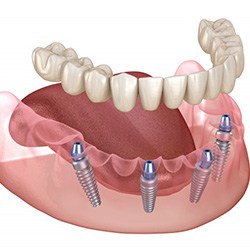
Twice a day, brush your dentures with a soft-bristled manual or electric toothbrush. Make sure that you use a non-abrasive toothpaste that doesn’t contain baking soda or any other stain-removing agents. It’s also crucial to floss your restoration at least once a day, and floss threaders are available for purchase if you need help flossing beneath it. You may want to invest in a water flosser to make it easier to clean your implants and your restoration. If you’re looking for a better way to clean between your dentures and your gums, sulcus brushes may be a great option since they are one-third the width of normal toothbrushes. You should also rinse with antibacterial mouthwash every day to prevent tartar from developing.
Dentures FAQs
Does an Upper Denture Always Cover the Palate?
Dentures in Savannah come in many styles, so they don't always have to cover the roof of your mouth. If you have concerns about discomfort or diminished taste sensations, your dentist will discuss all your options to find the ideal denture for your needs and situation, like one with a horseshoe shape. You may also be a candidate for an implant denture, which is another palate-less option.
Is a Broken Denture a Dental Emergency?
You can't go without any teeth, so a broken denture is a dental emergency. Do not continue wearing any damaged dentures. Wear an old pair if possible and contact your denture dentist in Savannah right away. Do not use super glue or other adhesives because they can contain toxic ingredients that can harm your health. Your dentist will get you into their office quickly to assess the damage. They'll determine if your denture can be repaired or if you'll need a replacement.
Can I Sleep with My Dentures?
Your dentist will instruct you to keep your dentures in your mouth for 24 hours after receiving them. After the first day, your dentures must be removed at night. Although no one wants to be caught without their teeth, your oral and overall health relies on their nightly removal. Your dentures will restrict circulation to your gums. If your soft tissues aren't allowed to recuperate, you can develop sores, pain, inflammation, and infections. Not to mention, bacteria will accumulate on your dentures overnight, damaging them over time and leading to unpleasant odors. It's best to take your dentures out before going to bed and clean them thoroughly. Place them an overnight soaking solution to kill any bacteria missed by your toothbrush. You'll keep your mouth healthy and get the most from your dentures.
Do I Use Regular Toothpaste to Clean My Dentures?
Your dentist will advise against using toothpaste and other abrasive products to clean your dentures. They can scratch your dentures, causing them to look discolored. Food residue, plaque, and bacteria can get trapped in the scratches, causing your dentures to stink and weakening them over time. Instead, use a soft-bristled toothbrush and a mild hand soap or dishwashing liquid to clean them. There are also denture cleaning kits available over-the-counter. Besides brushing your dentures, don't forget to clean the inside of your mouth with a soft toothbrush or cloth.
I Need a Checkup & Cleaning I am Worried About Bleeding Gums I Have a Cavity or Broken Tooth I am Missing One or More Teeth I am Unhappy with My Smile I Want a Straighter Smile I am Scared of the Dentist I am Looking for a Dentist for My Child I Have Pain When I Open or Close My Mouth I am in Pain & Need Help I Need My Wisdom Teeth Removed View Our Services
